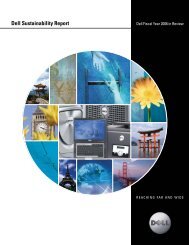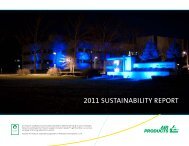Blueprint for Sustainability - Corporate - Ford Motor Company
Blueprint for Sustainability - Corporate - Ford Motor Company
Blueprint for Sustainability - Corporate - Ford Motor Company
- No tags were found...
Create successful ePaper yourself
Turn your PDF publications into a flip-book with our unique Google optimized e-Paper software.
CLIMATE CHANGE 19economy standards is in the best interest of consumers,dealers, automotive suppliers and vehicle manufacturers alike.The state GHG rules would impose fuel economy standardswhose rapid rate of increase and extreme stringency are notworkable within our business limitations. If the state GHG rulestook effect, we would be <strong>for</strong>ced to implement severe productrestrictions in those states within two or three model years, andwe would not be the only manufacturer in that situation. This, inturn, would lead to at least three adverse consequences. First,consumers in those states with the GHG rules would have fewervehicles to choose from than consumers in neighboring stateswithout the GHG rules. Second, states with the GHG regulationswould experience a sharp decline in vehicle sales, affectingemployment in those states dependent on automobile sales,most notably at dealerships. Third, to the extent they can,consumers in states with the GHG rules would go to otherstates to get vehicles they cannot buy at home.We believe that Congress intended to prevent the adverseeffects of state-specific standards when it included languagein the CAFE law preempting state regulations “related to” fueleconomy standards. We will continue advocating <strong>for</strong> theprinciple that the fuel economy standards in the U.S. should beset exclusively on a nationwide basis, as they have been sincethe CAFE law was passed in 1975. We supported passage ofthe 2007 Energy Bill, which significantly raises the fuel economystandard our vehicles must meet. National standards canachieve all of the environmental benefits of state standards,without the economic disruption and unintended local andregional effects of state standards.EuropeThe EU is a party to the Kyoto Protocol to the United NationsFramework Convention on Climate Change, and has agreed toreduce greenhouse gas emissions by 8 percent below 1990levels during the 2008–2012 period. In 1998, the EU agreed tosupport an environmental agreement with ACEA (the EuropeanAutomobile Manufacturers’ Association, of which <strong>Ford</strong> is amember) on carbon dioxide emission reductions from newpassenger cars. The ACEA Agreement established an emissionstarget of 140 grams of carbon dioxide per kilometer (“g/km”) <strong>for</strong>the average of new cars sold in the EU by the ACEA’s membersin 2008. This corresponds to a 25 percent reduction in averagecarbon dioxide emissions compared to 1995. To date, theindustry has made good progress, meeting an interim target <strong>for</strong>2003 (165–170 g/km); however, it is now apparent that theindustry will not achieve the 140 g/km target <strong>for</strong> the 2008 modelyear due to a number of factors, including consumer demandand the challenges associated with implementing various fuelsavingtechnologies.In 2005, ACEA and the European Commission reviewed thepotential <strong>for</strong> additional carbon dioxide reductions, with the goalof achieving the EU’s objective of 120 g/km by 2012. Thediscussions have advanced the concept of an integratedapproach to further reductions, involving the oil industry and<strong>Ford</strong> Focus ECOneticother sectors. In 2007, the discussions suggested a 120 g/kmoverall target, with a vehicle target of 130 g/km andcomplementary measures making up the other 10 g/km inemissions reductions. In December 2007, the EuropeanCommission issued a proposal to regulate vehicle carbon dioxidebeginning in 2012 at a fleet average of 130 g/km, using a slidingscale based on vehicle weight. This provides different targets <strong>for</strong>each manufacturer based on their respective fleets of vehicles,weight and carbon dioxide output. The proposal also establishesa penalty system as a provision <strong>for</strong> pooling agreements to shareor minimize the burden. This proposal is likely to be finalized bythe European Parliament in 2008 or 2009.<strong>Ford</strong> will play its part in achieving the required mandatoryobjective <strong>for</strong> vehicle CO2 emissions that will eventually be setby the EU. However, while the European auto industry is fullycommitted to continue reducing CO2 emissions from cars andsupports the (overall) EU objective of reaching a level of120 g/km, the industry believes that the EU Commission’sproposal does not offer the proclaimed balanced framework tocut CO2 emissions in the most effective way and to safeguardcompetitiveness and growth. Only a truly broad and integratedapproach involving all stakeholders – transport industries, fuelsuppliers, infrastructure providers, consumers and government –can result in larger and more cost-effective CO2 emissionreductions from road transport compared to focusing almostexclusively on vehicle technology. The industry will continue tocommunicate and clarify this message and trusts that theCouncil and the European Parliament will fully engage in anopen debate and reconsider the Commission’s strategy.INTRODUCTION GOVERNANCE CLIMATE CHANGE MOBILITY HUMAN RIGHTS VEHICLE SAFETY SUSTAINING FORD CONCLUSIONFor more in<strong>for</strong>mation visit:www.<strong>for</strong>d.com/go/sustainability

















